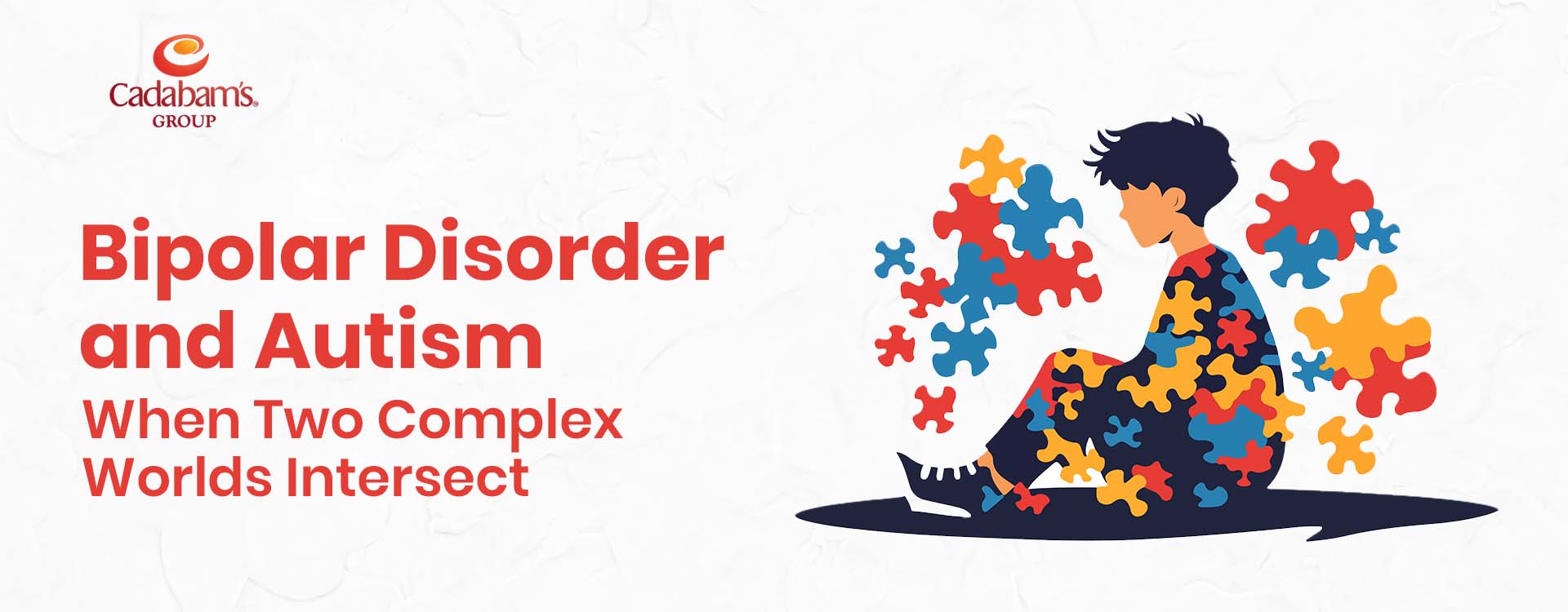Autism Spectrum Disorder
Autism, or Autism Spectrum Disorder (ASD), is a pervasive neurological developmental disability that hampers normal brain development. It affects speech and nonverbal communication, social skills, cognition, and behavior. Roughly three million people live with ASD in India. Autism is known as a spectrum disorder as its symptoms and characteristics appear in a variety of combinations that affect people in different ways.
There is a wide range of severity of Autism. Each person with autism has a distinct set of strengths and challenges. Different people with ASD disorder are observed to have a wide range of IQs. Some people with ASD do not use any verbal forms of communication, whereas some are highly verbal and conversational.
Autism Spectrum Disorder (ASD) Symptoms and Early Signs
Early Indicators of Autism Spectrum Disorder
Infancy Signs:
- Lack of eye contact
- Limited babbling or vocalisation
- No response to name by 12 months
- Absence of gestures (pointing, waving)
Social Communication Challenges
- Difficulty understanding nonverbal cues
- Challenges in friendships and relationships
- Lack of shared interests or enjoyment
Developmental Progress and Challenges
- Uneven skills
- Co-occurring conditions
- Minimal support needed with interventions
Our Professionals
What are the Main Causes of Autism Spectrum Disorder (ASD)?
Autism Spectrum Disorder (ASD) is caused by a combination of genetic, environmental, and biological factors. Several risk elements contribute to the development of ASD:
- Genetic Factors: Mutations in certain genes have been linked to ASD, suggesting a strong hereditary component. A family history of ASD increases the risk.
- Environmental Factors: Exposure to specific medications, pollutants, or infections during pregnancy has been linked to a heightened risk of autism spectrum disorder symptoms.
- Brain Structure and Connectivity: Differences in certain areas of the brain and how neurons communicate can contribute to autism symptoms.
- Pregnancy and Birth Complications: Premature birth, low birth weight, and complications during pregnancy or delivery may increase ASD risk.
- Advanced Parental Age: Children born to older parents have a higher risk of ASD.
Early identification of reasons for autism can aid in prompt diagnosis and personalised intervention strategies.
Autism Spectrum Disorder Recovery Guide
Understand the various aspects of this condition

What are the Different Types of Autism Spectrum Disorder?
Autism was once classified into multiple subtypes—such as Autistic Disorder, Asperger’s Syndrome, Childhood Disintegrative Disorder, and PDD-NOS (Pervasive Developmental Disorder – Not Otherwise Specified)—based on specific patterns of symptoms and development. However, these distinctions have been consolidated into a single diagnosis known as Autism Spectrum Disorder (ASD), acknowledging the diverse array of autism symptoms and levels of ability within the spectrum.
Asperger's Syndrome
Asperger’s Syndrome is a form of autism that typically involves challenges with social interaction and understanding nonverbal cues, along with a strong preference for routines and highly focused interests. However, unlike other forms of ASD, individuals with Asperger's typically do not have significant delays in language or cognitive development.
Pervasive Developmental Disorder (PDD-NOS)
PDD-NOS (Pervasive Developmental Disorder – Not Otherwise Specified) was a term once used for individuals who showed some characteristics of autism or Asperger’s, but didn’t meet the full diagnostic criteria for either condition. This category is used for those with significant social and communication challenges that don’t fully align with the definitions of other conditions on the spectrum.
Autistic Disorder (Classic Autism)
Classic Autism, known as Autistic Disorder, involves marked impairments in social interaction, communication challenges, and a tendency towards repetitive behaviours and interests. This form of autism is usually identified in early childhood and includes a wide range of functional levels, from severely affected to high-functioning individuals.
Disintegrative Condition in Children
Childhood Disintegrative Disorder is a rare condition characterised by late onset (typically after three years of age) of developmental delays in language, motor skills, and social function. Children with this disorder show normal development initially and then a significant loss of previously acquired skills.
Rett Syndrome
Rett syndrome is a rare genetic neurological disorder that occurs almost exclusively in girls. It leads to severe impairments, affecting nearly every aspect of the child's life: their ability to speak, walk, eat, and even breathe easily. The disorder's progression includes a period of regression followed by recovery or stabilisation.
Emergency service
Find nearest mental health center now

Toward a Brighter Future with Autism Spectrum Disorder: How Cadabams Can Help
Embark on a journey toward a brighter future with Autism Spectrum Disorder through Cadabam's comprehensive support and interventions. Cadabam's is renowned for its multidisciplinary team of specialists, including therapists, psychologists, counsellors, and educators, who collaboratively create tailored intervention plans. The centre embraces cutting-edge therapies and innovative strategies for addressing the challenges faced by people with ASD. With a strong focus on enhancing communication, social skills, and behavioural development, Cadabam's commits to improving the quality of life and independence of those it serves.
If you are searching for a solution to your problem, Cadabam’s Rehabilitation Centre can help you with its team of specialised experts. We have been helping thousands of people live healthier and happier lives for 30+ years. We leverage evidence-based approaches and holistic treatment methods to help individuals effectively manage autism spectrum disorder. Get in touch with us today. You can call us at +91 96111 94949.
Listen to Our Expert Insights on Autism Spectrum Disorder
Our centres where we treat Autism Spectrum Disorder
How is Autism Spectrum Disorder Diagnosed?
Diagnosing Autism Spectrum Disorder involves a comprehensive evaluation by specialists, including developmental paediatricians, psychiatrists, and psychologists. This process includes observing behaviour, assessing social and communication skills, and reviewing developmental history. Autism diagnosis may also involve cognitive and language assessments to understand the individual's strengths and challenges, providing a basis for tailored support and interventions. Recognising autism symptoms early improves access to effective autism spectrum disorder treatment.
What are the Risk Factors of ASD?
Risk factors for Autism Spectrum Disorder include genetic predispositions, such as family history of ASD, environmental factors like prenatal exposure to toxins, and biological aspects, including advanced parental age at the time of conception. Premature birth and low birth weight have also been identified as contributing factors.
Recognising these reasons for autism can aid in the prompt identification and intervention.
When Should You See a Doctor for Autism Symptoms?
It's advisable to consult a doctor if a child shows delayed speech or social milestones, lacks eye contact, engages in repetitive behaviours, or has a regression in developmental skills. Seeking early consultation can result in early autism diagnosis and intervention, which are critical for improving outcomes and support for individuals with ASD. A doctor can conduct detailed developmental assessments, identify autism symptoms accurately, and guide families toward appropriate autism spectrum disorder treatment and Autism therapy options.
Autism Spectrum Disorder Treatment and Rehabilitation
Treatment for ASD is personalised, focusing on improving communication and social skills and reducing behavioural challenges. It may include behavioural therapy, speech and occupational therapy, and educational support. As a result, autism medications can be prescribed for associated symptoms such as anxiety or ADHD. Rehabilitation for autism aims to enhance functioning and independence, relying on a multidisciplinary approach to cater to the diverse needs of individuals with ASD. The question is, can autism be cured completely? Remains uncertain whether early and consistent therapies significantly improve the quality of life.
Subscribe to our newsletter
Find out about centres, daily updates and more about mental health

Why Cadabam's?
Cadabams has over three decades of experience in treating diverse mental health disorders. We leverage this experience to provide you with the best treatment options possible! Do you need any personalized support about how to help a person or child with autism? Connect with our well-trained specialists who can help you with the right information, resources, and tools to help autistic adults cope with their daily activities. Reach us at our 24/7 helpline number- +91 96111 94949 or mail us at info@cadabams.org for more information about treatment options or any other queries on ASD or its treatment plans.
Facilities & Amenities
Frequently Asked Questions
Yes, autism is a developmental disability that affects social interaction, communication, and behavior, presenting from early childhood and affecting daily functioning and development.
The highest level of autism, requiring very substantial support, involves severe challenges in communication and behaviors significantly impairing daily life, necessitating extensive support.
The lowest level of autism, requiring support, is characterized by minor challenges in social communication and repetitive behaviors that slightly impair daily functioning.
The five disorders historically associated with the autism spectrum include Autistic Disorder, Asperger's Syndrome, Childhood Disintegrative Disorder, Rett Syndrome, and Pervasive Developmental Disorder Not Otherwise Specified (PDD-NOS).
An autistic child can lead a fulfilling life with tailored support, early intervention, and understanding from their community, enabling them to maximize their potential and well-being.
Autism Spectrum Disorder is a serious mental health disorder. But, with professional expertise the disorder can be managed. This disorder needs patience and resilience from caregivers as well.
Case Studies
Our Programs
Our Testmonials
Blogs you may be interested in
Helpline at your fingertips
+91 9611194949

.webp)








-min.webp)



.avif)

-min.webp)

.avif)

.avif)
.webp)



%202.avif)




